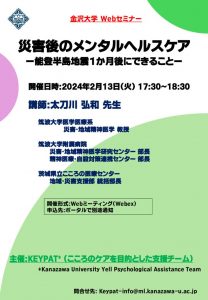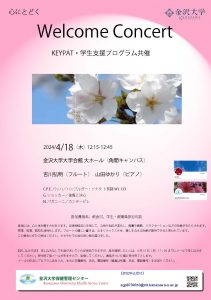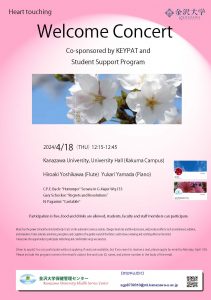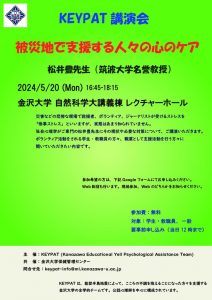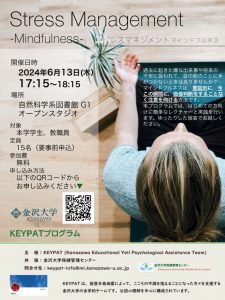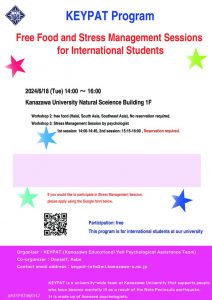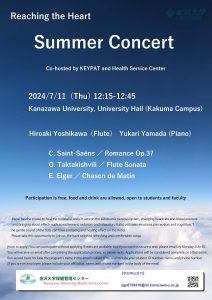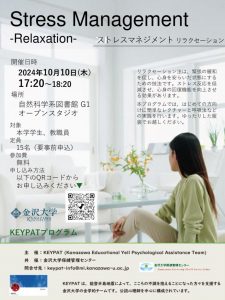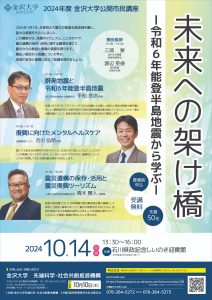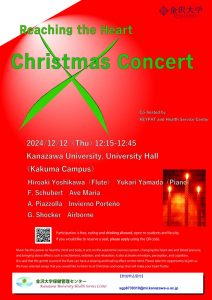KEYPATから学生・教職員の皆様へ(2025 12 9)
昨日12月8日夜、青森県で震度6強の地震がありました。北海道・三陸沖に後発地震注意情報が出されています。
上記の地域にご家族や友人・知人がいて心配されている方、
地震に関連する画像や映像を見て不安になっている方、
能登半島地震や過去の体験を思い出して落ち着かない方等
相談したい方は,相談希望であることを記載し,以下の相談窓口に申し込んでください。公認心理師が返信いたします。
KEYPAT(公認心理師、臨床心理士等から成る災害等におけるこころのケアを目的とした支援チーム)はみなさまのお役に立てればと思っています。
KEYPAT相談窓口
keypat-info@ml.kanazawa-u.ac.jp
@KEYPAT468342
*「KEYPAT」はKanazawa Educational Yell Psychological Assistance Teamの略(頭文字)
—
Message from KEYPAT to Students, Faculty, and Staff (Dec 9, 2025)
Yesterday, December 8th night, a strong earthquake with a seismic intensity of 6 Upper occurred in Aomori Prefecture. Following this, a “Subsequent Earthquake Caution Information” has been issued for the Hokkaido and Sanriku offshore areas.
We understand that this situation may be distressing. If you fall under any of the following categories, please do not hesitate to reach out:
Those who feel anxious because they have family, friends, or acquaintances in the affected regions.
Those who feel unsettled or distressed by viewing earthquake-related images or news footage.
Those who feel unstable due to recalling the Noto Peninsula Earthquake or other past traumatic experiences.
If you would like to consult with us, please apply to the consultation desk below. A Certified Public Psychologist will reply to you.
KEYPAT (Kanazawa Educational Yell Psychological Assistance Team) consists of Certified Public Psychologists, Clinical Psychologists, and other professionals dedicated to providing mental health care during disasters. We are here to support you.
KEYPAT consultation desk
keypat-info@ml.kanazawa-u.ac.jp
@KEYPAT468342
*”KEYPAT” is an abbreviation (initial) of Kanazawa Educational Yell Psychological Assistance Team.
KEYPATから学生・教職員の皆様へ(2024 11 27)
アニバーサリー反応について
令和6年能登半島地震から1年が近づいてきました。
節目の時期が近づくにつれ、当時のことを思い出したり、不安を感じたり、一度落ち着いていた心身の反応が再び現れることがあります。これをアニバーサリー反応といいます。
アニバーサリー反応は、地震で直接被害を受けていない方でも、誰にでも起こりうる自然な反応です。
この時期を穏やかに過ごすために、アニバーサリー反応への心の準備をしていただけたら幸いです。
〇アニバーサリー反応とは?
アニバーサリー反応は、過去のつらい出来事や大きな出来事から1か月、1年、10年といった節目の時期に、心身に不調が現れることです。
〇どのような反応が起こるのか?
感情面: 不安、悲しみ、イライラ、集中力の低下など
身体面: 睡眠障害、食欲不振、動悸、息切れなど
認知面: 当時の記憶がよみがえる、悪夢を見る、集中できないなど
行動面: 地震を思い出す場所や状況を避ける、過剰に警戒するようになるなど
〇きっかけとなるもの:
地震の anniversaries に関する報道
冬の天候や年末年始の雰囲気
地震に関連する画像や映像
昨日の地震(余震)もきっかけとなるかもしれません
〇アニバーサリー反応への対処法:
1 ご自身の感情を認める: どんな感情も否定せず、受け止めましょう
2 セルフケアを心がける: 十分な睡眠、バランスの取れた食事、リラックスタイムを確保しましょう
3 周りの人に話を聞いてもらう: 友人、家族、専門家に気持ちを打ち明けましょう
4 triggers を避ける: 地震に関するニュースや情報に触れる時間を制限しましょう
5 趣味や好きなことに取り組む: 気分転換になるような活動を行いましょう
〇サポート体制:
アニバーサリー反応でお困りの際は、一人で抱え込まずにご相談ください。
1 KEYPAT相談窓口: 公認心理師がご相談に対応いたします。
keypat-info@ml.kanazawa-u.ac.jp
@KEYPAT468342
*「KEYPAT」はKanazawa Educational Yell Psychological Assistance Teamの略(頭文字)
2 保健管理センター:
076-264-5255
hokekan@kenroku.kanazawa-u.ac.jp
月曜~金曜 08:30~17:00
参考資料:
厚生労働省 こころもメンテしよう こころと体のセルフケア
https://www.mhlw.go.jp/kokoro/youth/stress/self/index.html
厚生労働省 こころの耳 被災者に対するこころのケア
https://kokoro.mhlw.go.jp/victims/
文部科学省 「生きる力」をはぐくむ学校での安全教育
https://www.mext.go.jp/component/a_menu/education/detail/__icsFiles/afieldfile/2019/04/03/1289314_02.pdf
2024.11.28
KEYPAT・保健管理センター
To students, faculty, and staff, (2024 11 27)
Anniversary Reactions
As the one-year anniversary of the 2024 Noto Peninsula Earthquake approaches (January 1st, 2025), it’s important to be aware of the possibility of anniversary reactions. These are normal emotional and physical responses that can occur around the anniversary of a significant or traumatic event.
Even if you weren’t directly impacted by the earthquake, you might still experience anniversary reactions.
〇These reactions can include:
Emotional: Feeling anxious, sad, irritable, or having difficulty concentrating.
Physical: Changes in sleep patterns, appetite, or experiencing physical sensations like a racing heart.
Cognitive: Intrusive thoughts or memories, difficulty concentrating, nightmares.
Behavioral: Avoiding reminders of the earthquake, increased substance use, or changes in social interaction.
Triggers and Reminders:
〇Be mindful that certain things might trigger anniversary reactions, such as:
Media coverage of the anniversary
Winter weather or holiday season reminders Seeing images or hearing stories related to the earthquake
Yesterday’s earthquake (aftershocks) may also be a trigger.
〇Coping Strategies:
1 Acknowledge your feelings: Allow yourself to feel whatever emotions arise without judgment.
2 Practice self-care: Prioritize sleep, healthy eating, and relaxation techniques.
3 Connect with others: Talk to friends, family, or a mental health professional about your feelings.
4 Limit exposure to triggers: Reduce your consumption of news and social media related to the earthquake if needed.
5 Engage in healthy activities: Spend time doing things you enjoy, such as hobbies, exercise, or spending time in nature.
〇Support and Resources:
If you’re struggling with anniversary reactions, please remember you’re not alone. Support is available:
1 KEYPAT Consultation Desk: Our certified public psychologists are here to listen and offer support.
KEYPAT consultation desk
keypat-info@ml.kanazawa-u.ac.jp
@KEYPAT468342
*”KEYPAT” is an abbreviation (initial) of Kanazawa Educational Yell Psychological Assistance Team.
2 Health Service Center:
076-264-5255
hokekan@kenroku.kanazawa-u.ac.jp
Mon-Fri 08:30-17:00
〇Materials:
Ministry of Health, Labour and Welfare: Self-care for mind and body https://www.mhlw.go.jp/kokoro/youth/stress/self/index.html
Ministry of Health, Labour and Welfare: Mental care for disaster victims https://kokoro.mhlw.go.jp/victims/
Ministry of Education, Culture, Sports, Science and Technology: Safety education at schools that fosters “zest for life”
https://www.mext.go.jp/component/a_menu/education/detail/__icsFiles/afieldfile/2019/04/03/1289314_02.pdf
2024.11.28
KEYPAT・Health Service Center
KEYPATから学生・教職員の皆さんへ
令和6年9月能登半島豪雨の被害を受けた皆様に、こころからお見舞い申し上げます。
ご家族や友人・知人が被災された方もいらっしゃると思います。
このようなときは、不安になったり、なかなか眠れなかったりすることがあります。
一人で思いつめずに、こころの専門家とお話することがとても重要です。
KEYPAT(公認心理師、臨床心理士等から成る災害等におけるこころのケアを目的とした支援チーム)はみなさまのお役に立てればと思っています。
ボランティアで現地に入ったことがある学生・教職員の皆様も、ご利用ください。
相談したい方は,相談希望であることを記載し,以下にメールをお送りください。公認心理師が返信いたします。
KEYPAT相談窓口
keypat-info@ml.kanazawa-u.ac.jp
@KEYPAT468342
*「KEYPAT」はKanazawa Educational Yell Psychological Assistance Teamの略(頭文字)
資料
厚生労働省 こころもメンテしよう こころと体のセルフケア
https://www.mhlw.go.jp/kokoro/youth/stress/self/index.html
厚生労働省 こころの耳 被災者に対するこころのケア
https://kokoro.mhlw.go.jp/victims/
2024.9.23
KEYPAT・保健管理センター
To students, faculty, and staff
We extend our deepest sympathies to everyone affected by the devastating September 2024 heavy rains in the Noto Peninsula. We recognize the immense challenges and emotional distress that many may be facing due to the disaster, particularly if family, friends, or acquaintances have been impacted.
Please know that feelings of anxiety, sleeplessness, or other forms of emotional turmoil are entirely natural in the aftermath of such an event. If you are struggling, reaching out to a mental health professional can make a significant difference. KEYPAT, our team of public certified psychologists and clinical psychologists dedicated to providing psychological care in times of disaster, is here to support you. We welcome anyone affected, including students, faculty, staff, and volunteers who have been involved in relief efforts.
To consult with us, please email the address below. A certified public psychologist will respond.
KEYPAT consultation desk
keypat-info@ml.kanazawa-u.ac.jp
@KEYPAT468342
*”KEYPAT” is an abbreviation (initial) of Kanazawa Educational Yell Psychological Assistance Team.
Materials
Ministry of Health, Labour and Welfare: Self-care for mind and body https://www.mhlw.go.jp/kokoro/youth/stress/self/index.html
Ministry of Health, Labour and Welfare: Mental care for disaster victims https://kokoro.mhlw.go.jp/victims/
2024.9.23
KEYPAT・Health Service Center
*「KEYPAT」はKanazawa Educational Yell Psychological Assistance Teamの略
保健管理センターから学生・教職員の皆さんへ
*English follows Japanese.
このたび能登地方を震源とする大規模な地震が発生し、不安を感じておられる方も多いと思います。
このような災害、事件、事故を経験したときのストレスを緩和するために、情報提供をさせていただきます。
災害、事件、事故等のストレスの緩和のために
災害、事件、事故等に遭うと、私達は通常、「何も感じないし、考えられない」「亡くなった人のことばかりが思い出される」「考えがまとまらないし、体に力が入らない」といった感情の変化を起こします。変化は、年齢・亡くなった方がだれか(父、母、祖父母、恋人、友人、配偶者、子ども等)、自分の性格、周囲に助けてくれる方がいるかどうかなどによっても違いますが、これらは、深い悲しみを体験した後に生じる、当たり前の反応です。決して無理をしないで、ご自身の心を受け止めてください。
災害、事件、事故を経験したときに起こりうる反応
-
- からだの変化(熟睡できない、食欲低下、集中力の低下、疲れやすい等)
- こころの変化(涙が出てきて止まらない、現実だと思えない、悲しいという気持ちが起きない、いらいらや不安を強く感じる、強く自分を責めてしまう等)
- 行動の変化(今まで普通にできていたことができない、人と会うのを避ける、周りの人に怒ったりする等)
資料
ストレス災害時こころの情報支援センター 一般の方へ
国土交通省 気象庁
厚生労働省 こころもメンテしよう こころと体のセルフケア
厚生労働省 こころの耳 被災者に対するこころのケア
2024.1.5(最終更新 2024.06.03)
保健管理センター
To students, faculty, and staff
We believe many people are anxious about the recent large-scale earthquake in the Noto Peninsula.
We will provide information to alleviate stress when experiencing such disasters, incidents, and accidents.
To alleviate stress caused by disasters, incidents, accidents, etc.
When we encounter disasters, incidents, or accidents, we usually feel as follows: I can’t feel or think; all I remember is the person who died; I can’t think straight or have any strength in my body. Changes vary depending on your age, the person who is deceased (father, mother, grandparent, lover, friend, spouse, child), your personality, and support from other people. These psychological reactions are normal reactions after experiencing profound sadness. Never push yourself too hard, and accept your own heart.
Reactions that may occur when experiencing a disaster, incident, or accident
-
- Physical changes (inability to sleep well, loss of appetite, concentration, easy fatigue)
- Mental changes (tears that won’t stop flowing, not being able to believe it’s real, not feeling sad, intensely irritated or anxious, blaming yourself firmly)
- Changes in behavior (not being able to do things you used to commonly, avoiding meeting people, getting angry with people around you)
Reference materials
Materials from the NATIONAL INFORMATION CENTER OF STRESS AND DISASTER MENTAL HEALTH
Japan Meteorological Agency
Ministry of Health, Labour and Welfare: Self-care for mind and body
Ministry of Health, Labour and Welfare: Mental care for disaster victims
2024.1.5(update 2024.06.03)
Health Service Center
終了したプログラム
KEYPATでは,災害等におけるこころのケアに関する様々なプログラムを実施しています。

